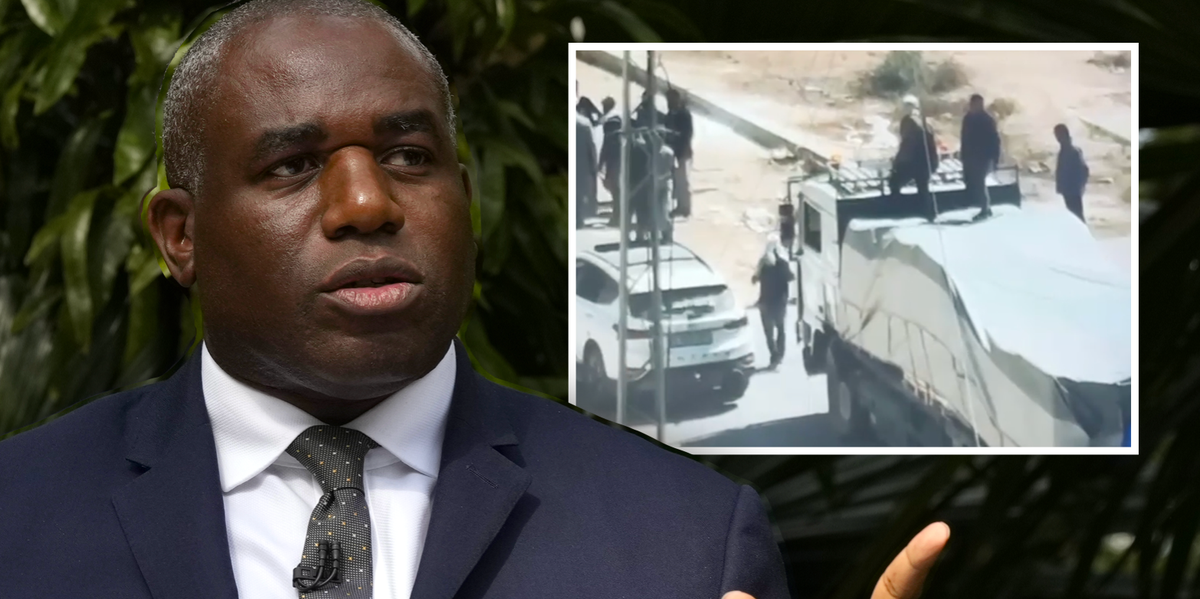The UK Government’s Arms Ban on Israel: A Complex Web of Humanitarian Crisis and Political Fallout
The ongoing conflict in Gaza has once again thrust the region into the global spotlight, particularly following the UK government’s recent decision to impose a partial arms ban on Israel. This move has sparked intense debate, with accusations of "bowing to the mob" and concerns over the implications for humanitarian aid in the region. Recent exclusive images shared with GB News have further complicated the narrative, suggesting that Hamas may be hijacking food aid trucks intended for civilians in Gaza.
The Arms Ban: Context and Implications
On September 2nd, David Lammy, the UK Foreign Secretary, announced the suspension of 30 arms licenses to Israel. These licenses included components for fighter aircraft, unmanned aerial vehicles (UAVs), naval systems, and targeting equipment. Lammy justified the suspension by asserting that there exists a "clear risk" that these arms could be used to commit or facilitate serious violations of international humanitarian law.
This decision followed an assessment of Israel’s compliance with international humanitarian law amid the ongoing conflict in Gaza, which was commissioned by Lammy upon taking office in July 2024. Under British law, ministers are required to apply a "clear risk" test when assessing arms exports, but the process is often criticized for its opacity and the difficulty in establishing facts on the ground.
The Humanitarian Crisis in Gaza
The humanitarian situation in Gaza has reached alarming levels, with reports indicating that aid convoys are being blocked, particularly at the Rafah border crossing—a crucial entry point for humanitarian assistance. Since Israeli forces captured the Rafah Crossing in May, the British Red Cross has reported that "only a trickle of aid is reaching the area," exacerbating an already dire humanitarian disaster.
However, eyewitness accounts and exclusive footage shared with GB News suggest that the situation may be more complex than a simple blockade by Israel. Daniel Berke, Director for UK Lawyers for Israel, claims to have witnessed Hamas gunmen hijacking food aid trucks en route to civilian areas. He asserts that these armed groups are aware that Israel is unlikely to target aid trucks, allowing them to operate with impunity.
Eyewitness Accounts and Evidence
Berke’s claims are supported by CCTV and drone footage shared by the Israel Defense Forces (IDF), which reportedly shows armed figures surrounding and commandeering food aid trucks. Aid workers in the region have corroborated these accounts, stating that they are frequently attacked by armed gangs who steal aid and sell it on the black market at exorbitant prices.
Georgios Petropoulos, head of the UN Office for the Coordination of Humanitarian Affairs (OCHA) in Gaza, described the looting as "profound," emphasizing the urgent need for meaningful decisions regarding civil order in the region. The lawlessness in Gaza has escalated following Israel’s military offensive, which has left the area devoid of effective governance and law enforcement.
Political Repercussions of the Arms Ban
The UK government’s decision to suspend arms licenses has drawn criticism from various quarters. Critics argue that the timing of the announcement—shortly after the return of six hostages to Israel—suggests a politically motivated decision cloaked in legal justifications. Israeli Prime Minister Benjamin Netanyahu has warned that the ban will only serve to "embolden Hamas," while the Israel Solidarity Movement has raised concerns about the potential impact on intelligence-sharing and the fight against Islamic extremism.
Supporters of the ban, however, argue that it does not go far enough. Halima Begum, chief executive of Oxfam, criticized the suspension of just 30 licenses out of 350, highlighting loopholes that allow components for F-35 fighter jets to remain available for export. She pointed out that the ongoing violence has resulted in significant civilian casualties, with over 1,100 people reportedly killed in Gaza during the parliamentary recess alone.
The Broader Implications
While the partial arms ban may not significantly impact Israel’s military operations—given its ability to source equipment from other countries—it sends a powerful political message at a time when tensions in the Middle East are escalating. The situation remains precarious, with the potential for a wider regional conflict looming on the horizon.
In response to inquiries about the looting of aid convoys, a spokesperson for the Foreign, Commonwealth & Development Office condemned the actions of those involved, emphasizing the urgent need for humanitarian aid in Gaza. Meanwhile, Orly Goldschmidt, spokesperson for the Israeli Embassy in the UK, reiterated that Hamas routinely hijacks aid intended for civilians, framing it as part of the organization’s broader modus operandi.
Conclusion
The intersection of humanitarian crises and political maneuvering in Gaza presents a complex and challenging landscape. As the UK government grapples with its arms export policies, the realities on the ground—marked by looting, violence, and a dire need for aid—underscore the urgent necessity for a comprehensive approach to the conflict. The situation calls for not only immediate humanitarian relief but also a long-term strategy to restore order and ensure the safety of civilians in Gaza. As the world watches, the stakes have never been higher.
